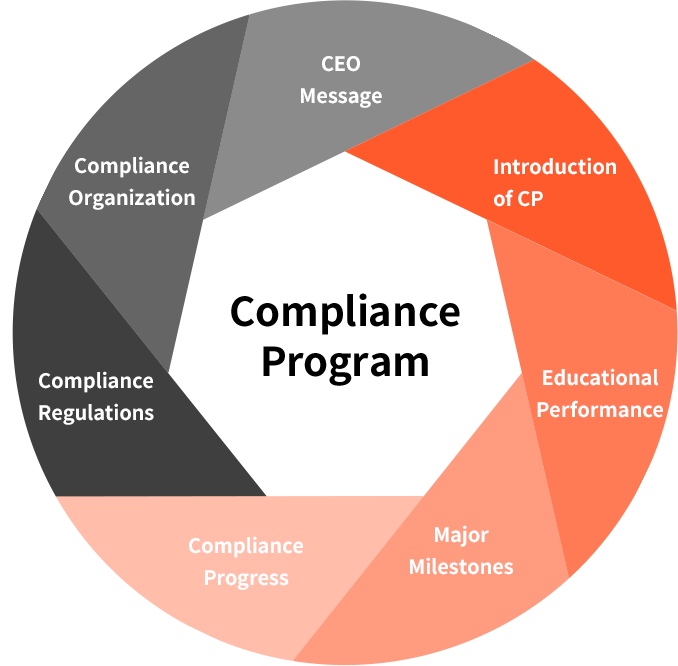DAEWOONG PHARMACEUTICAL CO.LTD.
Daewoong
Global Healthcare Group
The Best Partner for You
Global Healthcare Group
The Best Partner for You
Ethics
Management that places corporate ethical compliance with an assertive
attitude as the code of conduct
Compliance Program
Compliance
Program
Our entire staff is working hard so that Daewoong Pharmaceutical can
achieve the corporate mission of “offering total solutions
(pharmaceutical products, services) through the most valuable methods
that can contribute to improving the quality of life of customers.”
Furthermore, we place the utmost value in ‘corporate ethics’ in the
management and business activities of the company to pursue
transparent, fair and reasonable work progresses.
In order to create a ‘structure where not a single case of CP
violation occurs’, the employees of Daewoong Pharmaceutical operate a
compliance program based on the eight major elements of the CP.

Fair Trade Autonomous Compliance Program Operating Guidelines
Regulations related to fair trade
This refers to laws that the Fair Trade Commission has jurisdiction
over such as the Monopoly Regulation and Fair Trade Act and the Act on
Fair Labeling and Advertising.
All employees must be sufficiently aware of the precautions stipulated by the fair trade laws and comply with them thoroughly.
All employees must be sufficiently aware of the precautions stipulated by the fair trade laws and comply with them thoroughly.

Implementation of the eight core elements
- In order for a company to be recognized as having implemented CP, the following conditions must be satisfied.
- However, according to the Framework Act on Small and Medium Enterprises, Condition 5. may be set as the recommendations for SMEs.
- The eight major elements are the most important fundaments for implementing corporate law-abiding cultures and establishing a fair trade order.
- Condition 1. Standard and Procedure of CP
-
Standards and procedures shall be prepared and implemented so that
employees can clearly recognize and comply with applicable fair
transaction laws related to work.
Any change in applicable laws and industrial practices shall apply to the company’s standards without delay and be informed to employees so that they can clearly recognize such change.
Procedures which prevent any violation of applicable laws shall be prepared and distributed to employees in purchase or sales exposed to competition work in promoting products and bidding to purchase goods, and it shall be checked regularly whether procedures have been complied with. Any violation of applicable fair transaction laws or concern thereabout resulting from failing to comply with procedures shall result in disciplinary action against employees based on the principles of employee discipline. - Condition 2. CEO Message
-
CEO’s commitment and support for compliance with applicable fair
transaction laws shall be communicated to all employees through a
fair transaction declaration ceremony or document (including
electronic media).
CEO shall appoint a compliance officer with a resolution by the Board of Directors, establish a compliance committee if required to prepare organizations and systems needed to implement the compliance program (CP), and provide resources required for the efficient operation thereof.
CEO shall provide training to employees about complying with applicable fair transaction laws and preventing any violation thereof in consultation with the compliance officer, and make efforts to promote a free and fair competition culture by hosting training or events for subcontractors about applicable fair transaction laws and CP, if necessary. - Condition 3. Compliance Organization
-
The compliance officer shall be appointed by the Board of Directors
and informed to all employees. The compliance officer shall be
appointed from one of the senior managers knowledgeable about
applicable fair transaction laws and the company’s policies and
procedures, but in principle not someone directly in charge of
sales, purchase/procurement, display/advertisement, and customer
support.
The compliance officer shall oversee organizations and works to comply with applicable fair transaction laws, establish and implement the CP, have the authority and responsibility to create and amend the compliance manual, and plan, establish, implement, monitor, discipline, improve and operate the CP. - Condition 4. Autonomous compliance handbook
-
Based on the code of ethics and compliance control to establish
order in competition, the compliance manual shall be prepared under
the responsibility of the compliance officer and distributed to
employees in departments, such as sales or purchase where applicable
fair transaction laws are likely to be violated.
Clearly presenting the code of ethics and acceptable standards will prevent potential violations and improve fair transaction competencies. - Condition 5. Education and Training
- At least two hours of training (including online video training) to prevent violations of applicable fair transaction laws shall be provided every six months to employees in departments such as sales or purchase where applicable fair transaction laws are likely to be violated. The compliance officer shall retain documentation about development, implementation, and results for training programs for 5 years after the end of training.
- Condition 6. Monitoring
- There shall be a fact that the compliance officer reports the supervision or monitoring performance and plan to (or is approved by) the Board of Directors at least once every six months.
- Condition 7. Disciplinary action
-
Bylaws, which define disciplinary action against employees liable
for violating applicable fair transaction laws to the extent of such
violations, shall be prepared and operated.
If there is a concern or suspicion that any employee violates applicable fair transaction laws, the compliance officer shall investigate it immediately. If the employee has actually or potentially violated applicable fair transaction laws, the compliance officer shall take required disciplinary action such as exclusion from work, warning, transfer, suspension, wage reduction, and dismissal depending on the violation after fully consulting with CEO and heads of other departments.
If required, the compliance officer shall record, retain, and maintain investigations about law violations and related data and documentation. - Condition 8. Evaluation and Improvement measures
- To ensure Daewoong Pharmaceutical’s CP continues to be operated effectively, inspection or evaluation for standards, procedures, and operations shall be conducted at least once per year and improvement measures shall be taken accordingly.